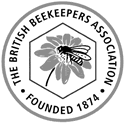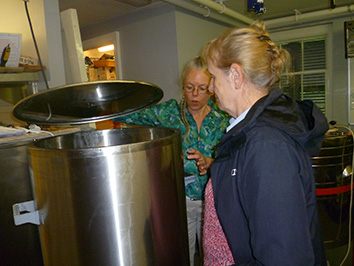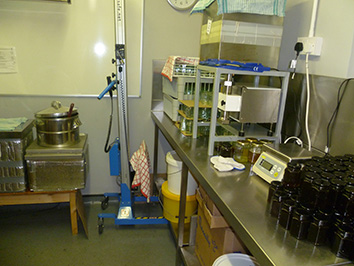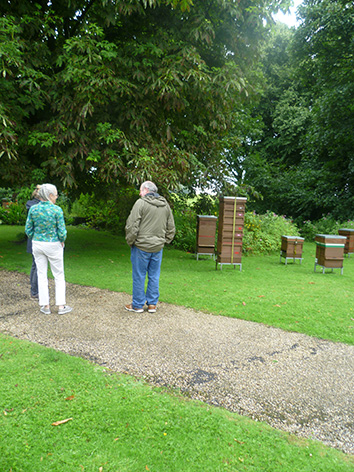

| Local Branches |
|
|
CBKA Excursion to Manchester Beekeepers Association
Penrith Beekeepers Association (PBKA) arranged for Cumbria Beekeeper Association (CBKA) members to visit Manchester Beekeepers Association (MBKA) on 22nd July. It turned out to be yet another very wet day!
This was an opportunity to exchange information on approaches to beekeeping and the way that another association provides experiences for its members and other visitors to its apiary.
MBKA is located in the Dower House, a restored Georgian folly which once belonged to the country estate that has now become Heaton Park.
A brightly coloured, formidable model of a bee is the first thing that visitors see as they arrive at the entrance to the site.
Over lunch, coffee and cake we chatted to the MBKA members about the impact that the summer dry spell and the current wet conditions were presenting to the bees.
We were able to see the facilities and experiences that they use to introduce visitors to the world of bees and train their own members.
The permanent two frame observation hive situated in their main meeting room/ shop there to show visitors. It generated a lot of interest and questions about how bees live inside a hive. The Honey Extraction room was also very impressive: the 'state of the art' large electric extractors and other electronic equipment was absolutely amazing.
Manchester BKA is keen to forge closer links with CBKA and are willing to provide training and other presentations via zoom. Collaborative initiatives could develop from this initial visit - watch this space!
The observation The external entrance for. Viewing the 12-frame honey hive inside the visitors and beekeepers to. extractor in the honey Dower House for observe the bees as they. extraction room. visitors to see. enter and leave the colony.
Honey production equipment Hives in the. The bee sculpture created by including a lift to transfer the vicinity of the. a local sculpture to welcome honey to the filtration Dower House. visitors to Manchester equipment and an automatic Beekeepers Association honey dispenser to fill the apiary. jars with the correct quantity.
|
||
|
|




